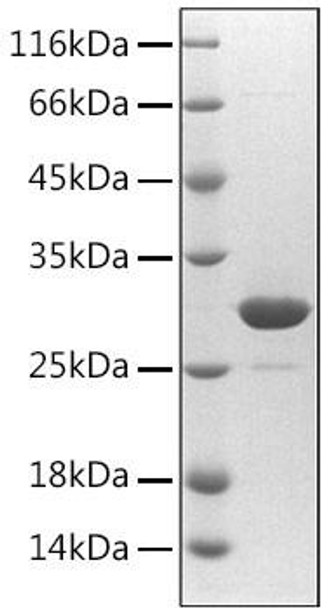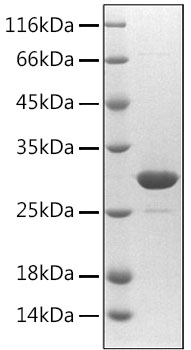Description
Recombinant Mouse Prostaglandin-H2 D-isomerase/PTGDS Protein
The Recombinant Mouse Prostaglandin-H2 D-isomerase/PTGDS Protein is a high-quality recombinant protein designed for murine biological research applications. This protein serves as an essential reagent in mouse model studies, comparative immunology research, and preclinical therapeutic evaluations, enabling scientists to investigate Prostaglandin-H2 D-isomerase/PTGDS biology and its relevance to human disease mechanisms through translational research approaches.
This product (SKU: RPCB1860) is produced using HEK293 Cells and features a C-His tag for convenient detection and purification. The protein exhibits a calculated molecular weight of 19.9 kDa with an observed molecular weight of 25-30 kDa under denaturing conditions, achieving ≥ 95 % as determined by SDS-PAGE., ensuring exceptional quality and consistency for research applications.
Key Features
| High Purity by Affinity Chromatography | |
| Mammalian & Bacterial Expression Systems | |
| High lot-to-lot consistency via strict QC |
| Product Name: | Recombinant Mouse Prostaglandin-H2 D-isomerase/PTGDS Protein |
| SKU: | RPCB1860 |
| Size: | 100 μg |
| Reactivity: | Mouse |
| Synonyms: | PGD2, PGDS, PGDS2, Ptgs3, L-PGDS |
| Tag: | C-His |
| Expression Host: | HEK293 Cells |
| Calculated MW: | 19.9 kDa |
| Observed MW: | 25-30 kDa |
| Gene ID: | 19215 |
| Protein Description: | High quality, high purity and low endotoxin recombinant Recombinant Mouse Prostaglandin-H2 D-isomerase/PTGDS Protein (RPCB1860), tested reactivity in HEK293 Cells and has been validated in SDS-PAGE.100% guaranteed. |
| Endotoxin: | < 1 EU/μg of the protein by LAL method. |
| Purity: | ≥ 95 % as determined by SDS-PAGE. |
| Formulation: | Lyophilized from a 0.22 μm filtered solution of PBS, pH 7.4. |
| Reconstitution: | Centrifuge the vial before opening. Reconstitute to a concentration of 0.1-0.5 mg/mL in sterile distilled water. Avoid vortex or vigorously pipetting the protein. For long term storage, it is recommended to add a carrier protein or stablizer (e.g. 0.1% BSA, 5% HSA, 10% FBS or 5% Trehalose), and aliquot the reconstituted protein solution to minimize free-thaw cycles. |
| Storage: | Store at -20℃.Store the lyophilized protein at -20℃ to -80 ℃ up to 1 year from the date of receipt. After reconstitution, the protein solution is stable at -20℃ for 3 months, at 2-8℃ for up to 1 week. |
PTGDS, also known as L-PGDS, belongs to the calycin superfamily, lipocalin family. Lipocalins share limited regions of sequence homology and a common tertiary structure architecture. They transport small hydrophobic molecules such as steroids, bilins, retinoids, and lipids. PTGDS is a glutathione-independent prostaglandin D synthase that catalyzes the conversion of PGH2 to PGD2. It is involved in smooth muscle contraction/relaxation and a variety of central nervous system functions. PTGDS may have an anti-apoptotic role in oligodendrocytes. It binds small non-substrate lipophilic molecules, including biliverdin, bilirubin, retinal, retinoic acid and thyroid hormone, and may act as a scavenger for harmful hydrophopic molecules and as a secretory retinoid and thyroid hormone transporter. It is likely to play important roles in both maturation and maintenance of the central nervous system and male reproductive system.







